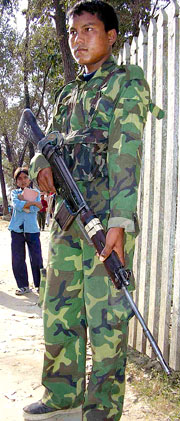 The Maoists, who have refused to lay down arms until the constituent assembly elections are held, have now put forward three new proposals for decommissioning. According to sources, the proposals include: storing weapons and troops in a designated area, locate Maoist weapons and warriors in a temporary barrack, or store weapons and use fighters in political work. The rebels would like the UN to oversee decommissioning and demobilization in all three of these options and the seven parties and government are said to have agreed with the proposals. The proposals come after the prime minister's recent visit to India during which India is said to have agreed to a future UN role in monitoring weapons decommissioning and demobilisation of the Maoists preceding a constituent assembly election in Nepal. Other than this, the Maoists and the seven parties agree that there is no need for outside mediation in the peace negotiations.
The Maoists, who have refused to lay down arms until the constituent assembly elections are held, have now put forward three new proposals for decommissioning. According to sources, the proposals include: storing weapons and troops in a designated area, locate Maoist weapons and warriors in a temporary barrack, or store weapons and use fighters in political work. The rebels would like the UN to oversee decommissioning and demobilization in all three of these options and the seven parties and government are said to have agreed with the proposals. The proposals come after the prime minister's recent visit to India during which India is said to have agreed to a future UN role in monitoring weapons decommissioning and demobilisation of the Maoists preceding a constituent assembly election in Nepal. Other than this, the Maoists and the seven parties agree that there is no need for outside mediation in the peace negotiations.
The Maoists had felt a bit left out after parliament started passing far-reaching political resolutions on state restructuring and this had delayed peace talks. But this logjam has now been removed after Home Minister Krishna Sitaula's meeting with Prachanda in Kaski after which the seven parties agreed to focus on peace negotiations and suspend parliament. The rebels have welcomed the suspension of parliament. The stand of the seven parties not to dissolve parliament is commendable because this would have created a vacuum


